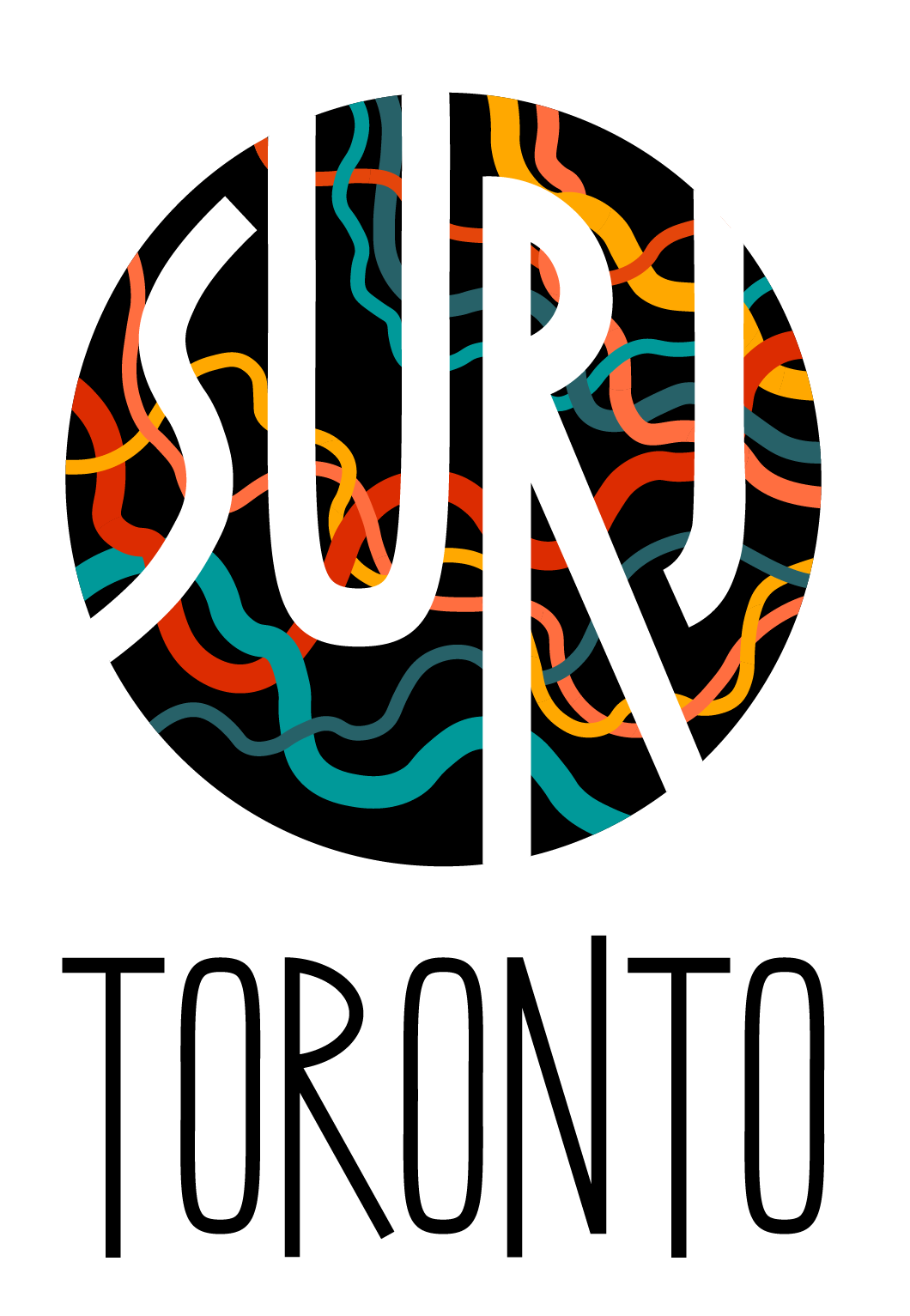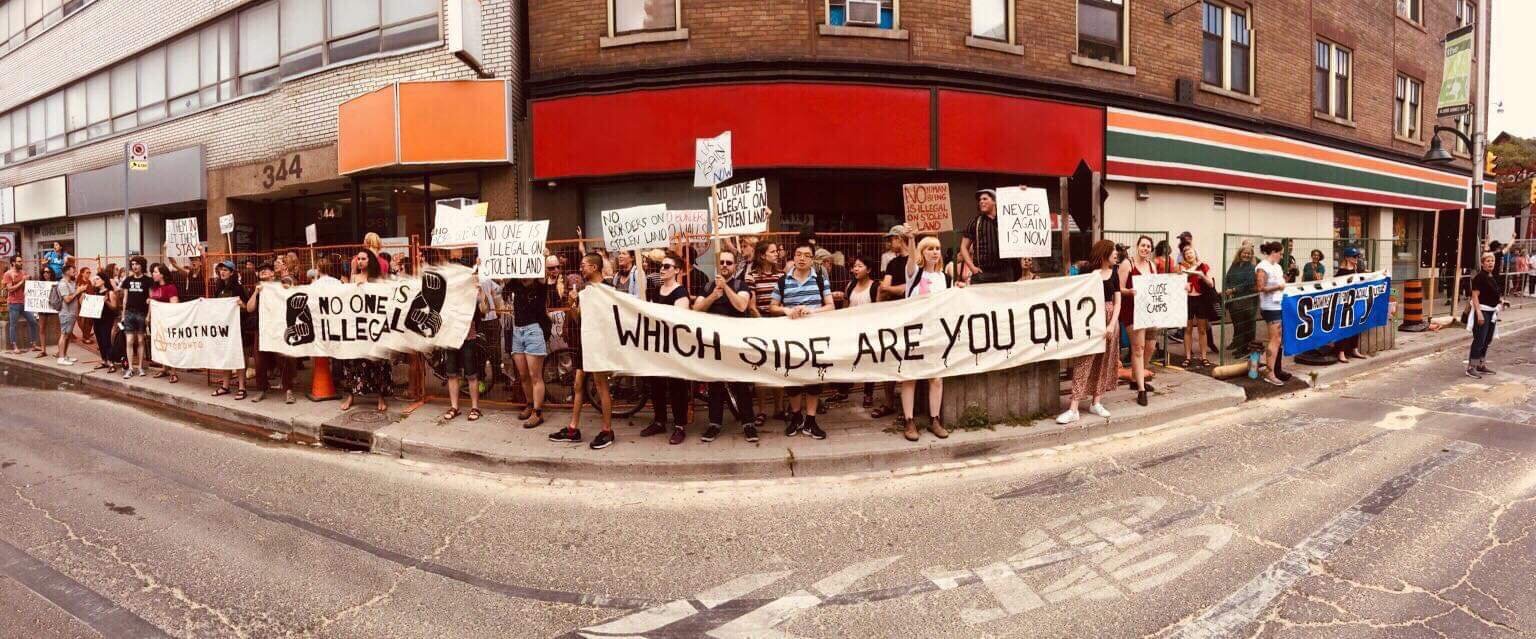SURJ Toronto
No one is free until everyone is free. That is why Showing Up for Racial Justice (SURJ) Toronto gathers white people into anti-racist action. Find your stake in racial justice, and challenge yourself to make a difference.
-
SURJ Toronto is a GTA-based grassroots organization, and a local chapter of SURJ National (US). We collaborate with Black, Indigenous, and racialized organizers, and move white people to take action to dismantle white supremacy and colonialism. SURJ Toronto gives members and supporters opportunities to learn, develop skills, deepen political analysis, build accountable relationships, and redistribute resources to Black, Indigenous, and racialized communities.
-
SURJ Toronto works to create mass movements of people acting in solidarity with justice movements led by Black, Indigenous, and racialized people. We know that we are not the experts on racism. We believe that white people do have a role to play in dismantling racist systems through educating, mobilizing, and redistributing resources from other white people to support racial justice and decolonization efforts.
Racism and settler colonialism rob all people of humanity, are violent systems to Black, Indigenous, and racialized communities, and are interlocked with other systems of oppression. White people have a key responsibility to undermine white support for white supremacy and institutions that uphold white supremacy, and to take on the challenging labour of moving more white people into multi-racial movements for racial justice.
While we take the lead from Black, Indigenous, and racialized organizers, white people must do the work of transforming white communities. We know that many white people feel unsure of what to do, how to do it, or where to start. We listen to Black, Indigenous, and racialized leaders, but we don't wait to be told what to do. White people need to show up, be moved past fear and guilt, and tip the balance of power to support racial justice! We will build a mass movement that challenges white supremacy, colonialism, and racism in all its forms.
Image description: A group of people at a protest with banners that read activist slogans such as “Which Side Are You On?” and “SURJ”.
“We need you defecting from white supremacy and changing the narrative of white supremacy by breaking white silence.”
— Alicia Garza, co-founder Black Lives Matter and Special Projects Director at the National Domestic Worker Alliance
Where We Are
SURJ Toronto organizes in and around Toronto, Ontario, so-called Canada, on territories that have been lived on, shared by, and cared for by Indigenous Nations – including the Anishinaabe, the Wendat, and the Haudenosaunee – since time immemorial. The gathering place of Toronto is today home to First Nations, Inuit, and Métis people from across Turtle Island, and to Indigenous people from around the world.
Toronto is subject to Treaty 13 with the Mississaugas of the Credit, and the Williams Treaties with multiple Mississaugas and Chippewa First Nations. These treaties have been misrepresented by settlers as constituting land purchases. A more illuminating understanding of the treaty relationship is represented by the Dish With One Spoon wampum belt, made between the Anishinaabe and Haudenosaunee as a commitment to relationship, to share resources and care-taking responsibilities of the territories surrounding the Great Lakes.
As a predominantly white settler activist organization that works to dismantle white supremacy and colonialism, we honour our relationships with grassroots Indigenous organizations that share these goals. Recognizing the ways in which our presence on this land reproduces dispossession and violence for Indigenous peoples, we commit to an ongoing process of learning, accountable action, and solidarity with Indigenous-led struggles for justice, sovereignty, and decolonization.
Vision
SURJ Toronto dreams of a Toronto where everyone is guaranteed the social and material conditions to lead flourishing lives. We envision an end to policing, borders and prisons, and the growth of collaborative, community-led initiatives which prioritize the equitable sharing of skills and resources. Our city will be grounded in anti-racism and decolonization, deepening the ways that we connect to and care for each other and the earth. In this Toronto, no one will be bound by the oppression and violence of white supremacy – all people, families and communities will experience the powerful possibilities of collective liberation.
Mission
Showing Up for Racial Justice (SURJ) Toronto is a network that organizes white people to fight against racism and colonization as part of a multi-racial movement for justice. We are white led with predominantly, but not exclusively, white membership.
SURJ Toronto offers a political home and a community of practice for anti-racist white folks. We work to deepen anti-racist skills and analysis, transform white communities, and contribute to local and national struggles against racism, colonialism, capitalism, and policing. By undermining white support for white supremacist institutions, shifting narratives and culture, redistributing labour and resources to build anti-racist organizing capacity, and campaigning around bold political demands, SURJ Toronto seeks to achieve short-term wins and seed long-term transformation.
We are answering a long-standing call from Black, Indigenous and racialized leaders to organize white people, and believe that we have an important role to play in the struggle against white supremacy. SURJ Toronto takes guidance from, collaborates with, and advances the demands of Black, Indigenous, and racialized organizers, and seeks to be accountable in centering the needs, vision, and strategies of communities most impacted by racism and colonialism. We also work from a place of mutual interest and believe that we have everything to gain by joining alongside racialized communities to fight for a just and livable world.
SURJ Toronto centres a culture of care, support, and relationship-building, while also pushing members to stretch themselves, take risks, and lean into discomfort. We recognize the intersectional identities of white people, and prioritize the leadership and participation of working class, queer, trans, femme, Jewish, and disabled members.
-
The focus of our energy is on working with white people who are already in motion. While in many activist circles, there can be a culture of shame and blame, we want to bring as many white people into taking ongoing action for racial justice and decolonization as possible. This means that we work toward building a culture of care in order to build a sustainable movement.
-
We know that we will have to take risks. Every day, BIPOC take risks in living their lives with full dignity and right now we are in a moment where Indigenous communities face ongoing colonization and young Black people are taking risks every day. We challenge ourselves and other white people to take risks as well, to stand up against a racist system, actions, and structures every day. We know that in that process, we will make mistakes. Our goal is to learn from those mistakes and keep showing up again and again for what is right and for racial justice.
-
We use the term mutual interest to help us move from the idea of helping others, or just thinking about what is good for us, to understanding that our own liberation as white people, our own humanity, is inextricably linked to racial justice. Mutual interest means we cannot overcome the challenges we face unless we work for racial justice and decolonization. It means our own freedom is bound up in the freedom of Black, racialized, and Indigenous communities. For Anne & Carl Braden, it was mutual interest that led them to desegregate an all-white neighbourhood in Louisville, Kentucky in 1954. It was a belief in what was right and the idea of showing up again and again for justice.
-
There can be an impulse for white people to try to get it right -- to have the right analysis, language, friends, etc. What SURJ was called upon to do at our founding in 2009 was to take action -- to show up when there are racist attacks, when the police attack and murder BIPOC in the street, their homes, our communities, in challenging structural racism and colonialism, as well as immigrant oppression. We maintain ongoing relationships, individually and organizationally with leaders and organizations led by BIPOC. We also know it is our work to organize other white people and we are committed to moving more white people for collective action. We can't re-build the world we want alone -- we must build powerful, loving movements of millions taking action for racial justice.
One more thing: You may not get the validation you hunger for. Stepping outside of the smoke and mirrors of racial privilege is hard, but so is living within the electrified fences of racial oppression – and no one gets cookies for that. The thing is that when you help put out a fire the people whose home was in flames may be too upset to thank and praise you – especially when you look a lot like the folks who set the fire. That’s OK. This is about something so much bigger than that.
-
One of the things that dominant white culture teaches us is to feel isolation and scarcity in everything we do. SURJ believes that there is enough for all of us, but it is unequally distributed and structurally contained to keep resources scarce. We can fight the idea and the structures that limit and control global capital by creating a different world together. We believe that part of our role as white people is to raise resources to support BIPOC-led efforts AND to engage more white people in racial justice. Together we can make the world we want and need.
-
Sometimes we get afraid that if we bring in new people who do not talk our talk or “do it right” it will mess up what we are building. However, if we do not bring in new people, our work cannot grow. And if our work does not grow, we cannot bring the numbers of white people needed to undermine white supremacy and join BIPOC-led efforts for fundamental change. Longtime white southern civil rights activist Anne Braden once said that we have to stop believing that we are the only special ones who can be part of the work for racial justice. We must grow our groups and our movement, understanding that welcoming people in, even at the risk of it being messy, is deeply part of what we are being called to do.
-
Dominant culture, media, and even sometimes movement leaders blame poor and working-class white people for racism, often without recognizing that middle- and owning-class white people disproportionately support policies and practices that uphold white supremacy. We reject the harmful stereotypes and analysis that poor and working-class white people are responsible for racism. The people who benefit most from racism and white supremacy are the very wealthy -- not poor or working-class white people. Poor and working-class BIPOC people and white people have been at the front lines of anti-racist struggle for generations. SURJ Toronto is committed to critically examining class within our organizing and taking steps to support the leadership of and organizing in poor and working-class communities. We need people of all class backgrounds in this work.
Values
Adapted from SURJ National
More About Who We Are
“The battle is and always has been a battle for the hearts and minds of white people in this country. The fight against racism is our issue. It’s not something that we’re called on to help People of Colour with. We need to become involved with it as if our lives depended on it because really, in truth, they do.”
— Anne Braden, American white anti-racist organizer


